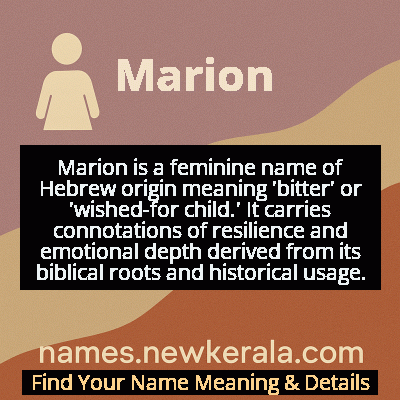Marion Name Meaning & Details
Origin, Popularity, Numerology Analysis & Name Meaning of Marion
Discover the origin, meaning, and cultural significance of the name MARION. Delve into its historical roots and explore the lasting impact it has had on communities and traditions.
Name
Marion
Gender
Female
Origin
Hebrew
Lucky Number
7
Meaning of the Name - Marion
Marion is a feminine name of Hebrew origin meaning 'bitter' or 'wished-for child.' It carries connotations of resilience and emotional depth derived from its biblical roots and historical usage.
Marion - Complete Numerology Analysis
Your Numerology Number
Based on Pythagorean Numerology System
Ruling Planet
Neptune (Ketu)
Positive Nature
Intuitive, analytical, spiritual, and inquisitive.
Negative Traits
Secretive, reserved, aloof, and can be overly critical.
Lucky Colours
Green, yellow.
Lucky Days
Monday.
Lucky Stones
Cat’s eye, moonstone.
Harmony Numbers
1, 5, 6.
Best Suited Professions
Scientists, researchers, spiritual leaders, detectives.
What People Like About You
Depth of knowledge, analytical skills, spirituality.
Famous People Named Marion
Marion Cotillard
Actress
Won Academy Award for Best Actress for her portrayal of Édith Piaf in 'La Vie en Rose'
Marion Jones
Athlete
Won three gold medals and two bronze medals at the 2000 Sydney Olympics before they were rescinded
Marion Barber III
Football Player
Pro Bowl selection in 2007 and set Dallas Cowboys record for most rushing touchdowns in a season
Marion Davies
Actress
Starred in over 40 films and was one of the highest-paid actresses of her era
Name Variations & International Equivalents
Click on blue names to explore their detailed meanings. Gray names with will be available soon.
Cultural & Historical Significance
Extended Personality Analysis
Women named Marion are often characterized by a unique blend of strength and sensitivity that reflects the name's complex meaning. The 'bitter' connotation translates not to negativity but to emotional depth and resilience—these individuals typically possess the wisdom that comes from navigating life's challenges with grace. They tend to be perceptive and intuitive, often understanding situations and people on a deeper level than most. Their quiet confidence and determination make them natural leaders who inspire trust and loyalty in others. Marion's are typically practical problem-solvers who approach difficulties with a calm, methodical mindset, yet they maintain a rich emotional life and strong connections to family and tradition. While they may appear reserved to strangers, those who earn their trust discover fiercely loyal friends with sharp intellects and dry wit. Their combination of emotional intelligence and practical competence makes them exceptionally well-equipped to handle both personal and professional challenges.
Modern Usage & Popularity
In contemporary naming practices, Marion has experienced a notable revival as part of the vintage name trend that values classic, time-tested names with historical significance. While it reached its peak popularity in the 1920s-1940s, the name has maintained a consistent presence and is now seeing increased usage among parents seeking names that are both traditional and distinctive. Modern usage patterns show Marion appealing to educated, cosmopolitan parents who appreciate its cross-cultural flexibility and professional sound. The name works equally well in corporate settings and creative fields, giving it broad appeal. Current data indicates steady usage in English-speaking countries with particular strength in France and other European nations where its historical roots are deeply appreciated. The name's ability to feel both classic and fresh, combined with its strong female associations from historical and contemporary figures, positions it well for continued relevance in the 21st century naming landscape.
Symbolic & Spiritual Meanings
Symbolically, Marion represents the alchemical transformation of hardship into wisdom, embodying the concept that our most challenging experiences often become our greatest sources of strength. The name's 'bitter' meaning evolves metaphorically into representing depth of character, resilience, and the wisdom that comes from navigating life's complexities. Like the process of creating fine wine or rich coffee where bitterness contributes to depth of flavor, Marion symbolizes the beautiful complexity that emerges from life's difficulties. The name also carries symbolic weight as a bridge between generations—honoring tradition while embracing progress, maintaining family connections while forging individual identity. In a broader sense, Marion represents the enduring feminine spirit that nurtures, protects, and perseveres, drawing from its biblical origins as the sister who ensured her brother's survival and destiny. This rich symbolic tapestry makes the name a powerful choice that acknowledges life's challenges while celebrating the strength and beauty that emerge from them.

